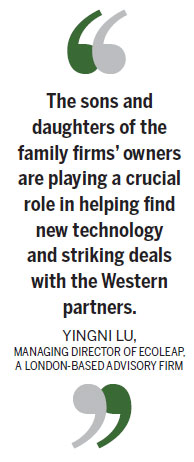Avoiding the generation trap
Updated: 2015-09-25 08:01
By Cecily Liu(China Daily Europe)
|
|||||||||||
The complexities of Chinese family business succession loom large for the economy and have created an entire industry in China and in Europe
China's family business succession planning has become a major issue for the Chinese economy - so much so that advisers from Europe are keenly eyeing the burgeoning market.
These firms of advisers, collectively known as family offices, are in business to help China's family businesses pass the reins to the next generation, and as part of the process are arranging education for their children, providing tax and investment advice, and helping them strengthen their corporate governance.

This in turn helps such Chinese firms become more international, as their children are often educated overseas and learn to embrace Western business culture.
Many Chinese family businesses are in urgent need of internationalization. Technology from markets abroad can help them achieve needed structural shifts and technology upgrades as China's economy changes from an export-driven to a consumption-driven model, says Lu Yingni, managing director of EcoLeap, a London-based advisory firm.
"A lot of these companies are from a manufacturing background and are now very keen to look for European technology because they are losing their cost advantage," Lu says.
Because much of the advanced technology, in industries such as healthcare and renewable energy, exist in markets like the United Kingdom, the United States and Germany, many Chinese family companies are now venturing into overseas markets for the first time.
"In this process, the sons and daughters of the family firms' owners are playing a crucial role in helping find new technology and striking deals with the Western partners," Lu says.
"Many of them have studied and lived abroad previously, they speak fluent English and understand the business culture of Western markets. They know the cultural differences between their parents and the Western partners, so they can greatly help both sides to understand each other."
In recent years, many European family offices have recruited Chinese clients, one example being Oracle Capital Group, whose headquarters is in London.
Oracle Capital started to work with Chinese clients only 12 months ago, yet they account for 10 percent of the company's total client numbers. Out of its 100-plus employees, there are five Chinese-speaking advisers.
"The Chinese market is hugely important for us, and we think in the next few years there will be a transformation of Chinese family firms using services from family offices more actively, so we want to take the leading position and be prepared," says Anton Davidenko, head of marketing communications at Oracle Capital Group.
In March, Oracle established a partnership with the Chinese asset and wealth management firm Shanghai International Trust to provide services for its family business clients looking for a more global reach. Shanghai International Trust will also help Oracle better communicate with its clients in China.

Davidenko says most of Oracle group's Chinese clients are first-generation owners already facing succession plan problems, but at the same time are looking to expand outside China or to diversify investments overseas.
The company has asset managers to help clients invest overseas to help spread risks. It also helps the businesses with global expansion plans, acquainting them with overseas rules and regulations, and helps them find overseas directors. It also helps them become more transparent, with better corporate governance structures in line with overseas markets.
In this process, Oracle group's knowledge of family businesses comes into play. For example, family businesses are more prone to resist introducing outside management when they expand overseas, but this is not the most efficient way to grow in a mature market, so Oracle group helps them find answers they are happy with.
Besides helping arrange schooling, the company can arrange internships for them so they will understand how to work in a Western business environment. Oracle group also uses its own charity trust to teach Chinese children how to do philanthropic work, another defining characteristic of successful family firms.
Because trust is a key aspect of Chinese family businesses' overseas expansion, some have managed to find partners through Opportunity Network, an invitation-only digital matchmaking platform that enables members to share business opportunities anonymously.
The network has more than 3,000 members in 75 countries, and one-fifth of the members are Chinese family businesses or family offices that advise Chinese family businesses.
The network grew from the Columbia Business School's Family Business Club, and in China it is a partner with four institutes of higher learning: Tsinghua and Hong Kong universities, Hong Kong University of Science and Technology, and the China Europe International Business School.
Brian Pallas, founder of Opportunity Network, says his staff has witnessed a large number of Chinese family businesses making overseas acquisitions in Europe, gaining high-end technology and expertise to take back to China.
This outward investment by Chinese family businesses has coincided with European family businesses selling some of their assets.
Some sellers want to diversify and invest capital in other countries, while others are forced to do so by the lack of liquidity stemming from the economic downturn in parts of Europe in recent years.
Some second-generation owners of Chinese businesses who have studied overseas start their career by setting up businesses in Western markets when they graduate, leveraging their parents' company resources as their competitive advantage, says Gong Hui, founder of Crescent Quant.
While at university, Gong tutored many Chinese students who are the children of first-generation business owners. "Many of them want to stay in the UK, as they believe they have a new platform that allows them to be much more international-minded, so they test the waters by starting businesses here".
One of his students who learned about fashion design in the UK has started a design studio, using fabric produced by her family's business in China.
Another, whose family operates a very successful restaurant in China, has established a restaurant in the UK using the same model, and through the family's connections has brought highly skilled chefs to the UK to cook authentic Chinese dishes. The UK business also has invited Western chefs to go China to offer Western food through the family restaurant.
"It may be difficult for many Chinese graduates to do business in a Western market, but resources and expertise built up through their parents' generation give them an edge in this market, and over time they can combine their own enterprise with their family business' activities to maximize the benefit of both businesses," Gong says.
Cui Zhijian, an assistant professor of operations management at the IE Business School, a graduate school in Madrid, says one major problem with Chinese family businesses' succession planning is the big differences in thinking between first and second- generation entrepreneurs.
Whereas the first generation is risk averse, as they have mainly focused their attention on the real economy by producing physical products, their children, who have grown up seeing big profits from financial markets, are keen to invest in high-return markets despite the risks.
Cui says the majority of Chinese second-generation entrepreneurs who have great confidence in the power of highly leveraged investments are largely influenced by the US financial market's ideology, which differs in important ways from the European markets, where many century-old family businesses have focused on safe and steady growth.
In Spain, two well-known family businesses are the fashion brand retailer Zara and the Spanish bank Santander, both of which have become very large while keeping their family business mentality, Cui says.
"These businesses have great risk management skills because the family members control a large stake in the business, therefore their mentality is much more careful compared with hired management, and their thinking is more long term."
Santander was one of the banks least affected by the financial crisis in 2008 because, as a family business, it avoided high-risk, high-return derivative financial products, and its slower growth was compensated by stability during the crisis.
In addition, these family businesses often treat employees like family, making their corporate culture friendly and a motivating force for employees, Cui says. He cites the example of a human resources manager who, after joining Zara, harshly criticized a shop assistant. She received a call from one of Zara's top management figures, saying that such behavior is unacceptable and every single employee should be treated as one of the family.
"Right now the European family businesses' mentality is similar to that of the first-generation Chinese family business, because they play things safe, but their children's mentality is closer to the American businessmen who embrace risks."
Cui says IE Business School has joined with Cheung Kong Graduate School of Business in China to provide lessons on succession planning for many experienced first-generation family business owners. However, students have found the difference in thinking frustrating.
"The challenge is great, because many first-generation Chinese business owners are losing their insight on China's rapidly evolving economy, where traditional manufacturing firms are losing their advantage, but their children's skills are lagging behind and they are not strong enough to take over the business."
In contrast, many Spanish family businesses are able to make a smooth transition between the generations because their children have been heavily influenced by their parents' way of thinking, so they also seek to maintain those advantages while developing newer solutions by themselves.
Despite the significant market potential of recruiting Chinese family business clients, many European advisers are encountering challenges. One is that their Chinese clients do not always trust strangers with the most intimate details of their businesses. Also, the European advisers do not always realize the extent of their clients' needs.
Another problem was encountered by the 88 Initiative, a project started in 2013 with the aim of pairing Chinese students and their parents' capital with UK high-growth companies.
The project was started by Paul Judge, Richard Heygate and Rob Wylie, three well-known figures in Britain's venture capital industry, who saw young Chinese students at UK universities as a good point of access for a lot of Chinese private sector capital that could potentially be invested overseas.
The 88 Initiative essentially works as a networking group and a consultancy. The intention was for the Chinese family businesses to invest in the companies under the UK Tier 1 entrepreneur scheme, with their children working at the companies as a part of the management team, learning lessons that could be used later to help their family business internationalize. When their parents saw the value of the companies they were working at, they would invest further in the UK firms.
But the project has not worked so well because the Chinese students are too young and inexperienced to contribute much to the UK firms, which are unwilling to make them directors as required by the entrepreneur scheme.
Looking back, Heygate says, he has changed his mind about the business model. "Traditional Chinese family businesses will stick to the game they know, and are unlikely to let their kids take over - hence China needs to go with the highly successful new game it has created."
Lu, who is also a director at 88 Initiative, adds that because the older-generation owners of family businesses have a mindset of retaining too much control in the decision-making process in overseas deals, as opposed to allowing their children to be in charge, such deals are difficult.
"They often do not quite understand the overseas market, so they are afraid of taking risks, and often it is difficult for their children to persuade them."
The problem is acute in relation to technology in particular. Because a lot of Western market technology is complex and highly innovative, it is difficult for the older generation to judge its value, Lu says.
"This also creates frustration on the British partners' side. They may have a very good conversation with the Chinese CEO's sons and daughters, in the end only to realize the parents have not given approval so the deal falls apart."
She says this challenge is common among Chinese family businesses because their current owners are mostly first-generation Chinese entrepreneurs who have created and grown the businesses themselves, hence their pride and confidence in their own abilities.
This mentality is different from many Western family businesses that have been passed down through generations, in which each generation tries to delegate increasing power to the next generation as a part of their succession planning, she says.
That is why many European educators are creating classes to help China's first-generation entrepreneurs become more flexible. The 88 Initiative teamed up with the University of Cambridge to provide a training program in September for Chinese family businesses called an "innovation master class".
"Chinese family businesses face a lot of challenges, but the opportunity and value we can provide for them by working together is very big, and we hope to start with educating them and helping them to build the right attitude and mindset to take their family businesses," Lu says.
cecily.liu@chinadaily.com.cn

(China Daily European Weekly 09/25/2015 page14)
Today's Top News
Hundreds killed in Saudi Hajj stampede
Volkswagen to pick Porsche boss as new CEO
EU leaders claim unity regained, pledge aid for Syrians
Business leaders, experts applaud Xi's speech in Seattle
Premier encourages innovation
Xi calls for safe cyberspace, reassures US business titans
Volkswagen CEO quits after carmaker rocked by diesel scandal
EU pushes through plan to relocate 120,000 refugees
Hot Topics
Lunar probe , China growth forecasts, Emission rules get tougher, China seen through 'colored lens', International board,
Editor's Picks

|

|

|

|

|

|






